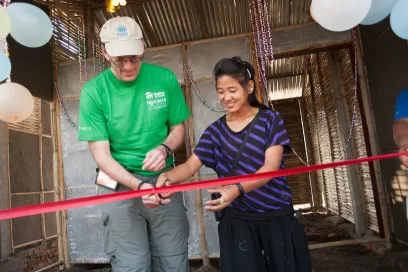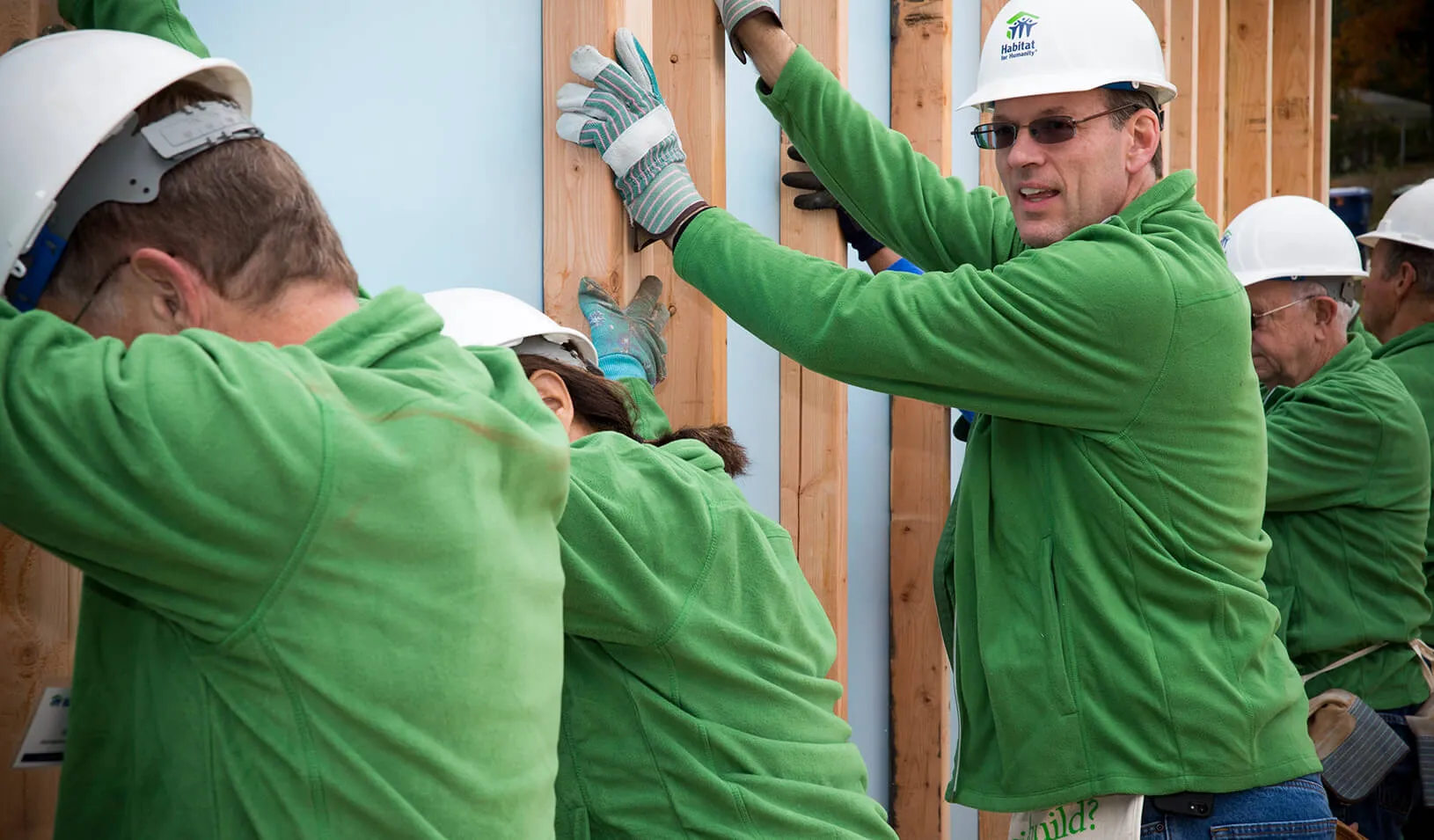October 26, 2015
| by Ian ChipmanJonathan Reckford’s career road map has been a circuitous one. It includes a stint on Wall Street, executive and managerial positions in the corporate sector, coaching the Korean Olympic rowing team, and time as an executive pastor.
But when he was asked in 2005 to consider becoming the next leader of Habitat for Humanity, everything snapped into place. “I remember the shot of adrenaline going down my spine when I got that call,” Reckford says. “Habitat for Humanity integrated my faith and my work in a very complete way.”
In the 10 years since Reckford took the reins as CEO of Habitat for Humanity, he has led a steady amplification of the organization’s impact. He helped widen the scope of Habitat’s mission to include holistic neighborhood revitalization, in response to the housing crisis of 2008, and formal disaster relief efforts, following the Indian Ocean tsunami of 2004 and Hurricane Katrina in 2005. He has overseen new microfinance and advocacy initiatives to help the neediest populations secure loans and access to land. Under his leadership, the nonprofit’s housing-product recycling enterprise Habitat for Humanity ReStores kept more than 128,000 tons of materials out of landfills and generated $110 million in profits, used to build more homes.
All the while, Habitat’s core model of helping family after family build one life-changing home at a time has flourished. He has seen the number of families that partner with the organization grow more than tenfold over the past decade, from 25,000 per year to more than 300,000 in fiscal year 2014.
“I have met so many families all across the world and seen how the process of earning their home and helping build it has really changed their self-identity,” Reckford says. “There’s a mindset shift. Rather than being a victim, now someone has a whole different identity. Habitat families are now property owners and taxpayers, adding economic value to the community. I love seeing that sense of transformation.”
Here, Reckford, a 1998 MBA graduate, shares four stories that speak to that elemental power of a home to transform lives and communities across the world.
Cambodia
The tangible aspects of being in a safe home are better health, better educational outcomes, better livelihood prospects. But there are also intangible aspects, like being able to feel safe. We tend to take it for granted that you can lock the door.
Last year, with my daughter and a group in Cambodia, Habitat built a home in partnership with a woman named Soy Lorng and her family. Her husband had HIV/AIDS and eventually died from it. The family lived in a one-room shack with no electricity, no water, no sanitation, next to a garbage dump over a sewage pool. And ultimately they couldn’t even afford to live there, so they were literally squatting on the street under a tarp.
We were in Phnom Penh. It rains really hard in Cambodia. Soy Lorng told me that the night before we finished their house, it had just poured rain. She actually spent the night standing up — trying to hold the tarp from ripping apart and trying to keep her two kids and her mom dry along with all their belongings.
We dedicated their house, and just as we cut the ribbon, a big storm blew in. It started pelting down rain. She invited us into her new room, and we were all sitting on the floor that had just been finished. I watched as she and her daughter were looking around the walls and the ceiling to see if the water was going to come in. Great smiles broke out on their faces when they realized they were going to be safe from the elements. For the first time, instead of thinking, “Can I survive?” those children can begin to think about having a future. That’s why we build.
Bolivia
Primarily, single-family homeownership has been the heart of Habitat. But recently, we’ve gone into advocacy in a bigger way. The fact that we build in all these places gives us the credibility to influence the policy environment, so we’ve become very active in trying to impact housing policy, specifically.

Jonathan Reckford celebrates the completion of a new home in Nepal with a partner homeowner. | Courtesy
We worked for about five years with Habitat Bolivia to impact the ability for women to own property. In Bolivia, women did not have the right to own their houses or their land. You can think about all the issues that come with that in terms of economic empowerment — or disempowerment.
We trained a cadre of mostly women and some men on how to work the legal process to try to get title. That original group not only got title, they got the laws changed, which means that 1.8 million people were impacted. We’ve since trained more than 400 people in the legal pathways and processes to secure land and property rights. While we’ve still got to help them move from being enabled to actually getting title, that creates the environment where Habitat and other groups can help these families get the right to their property. So we’re doing a lot of work particularly around access to land for housing and property rights protection for the poor and vulnerable around the world.
North Carolina
In the town of Winston-Salem, North Carolina, a couple hours from my hometown, there is a neighborhood called the Cherry Street community. This was a historically African-American community, architecturally important, in a great location near downtown. But for decades it had been going downhill — and then when the recession hit, things got worse yet.
The local [Habitat] affiliate interviewed the families there and found that what they really wanted was, first, for the community to be a place where young families would move back in again — instead of escaping the first chance they got. And, second, they wanted to do something about the extremely high crime rate and issues with drugs.
Habitat built a coalition with the community organization and made a commitment to tear down and rebuild 16 homes to change the visual look at the entrance to the community. Because of that commitment, private developers bought up other houses and rehabbed them as rental housing. Another nonprofit rehabbed some old, architecturally important rental housing into new, green rental housing. Then we got a commitment for a new charter school. The city agreed to increase the police presence in the community. And finally a wealth of faith organizations, the university, and others came out and participated.
I visited two years into the project, and I remember a policeman named Billy who walked me around. He stopped me and said, “You know, if you’d come here two years ago, I’d be here to protect you.” Then, with a big sweep of his arm, he said, “Now look what we’ve done.”
The before-and-after pictures are fairly breathtaking. Crime was already down 70% in the community. The charter school was doing really well and had a dynamic principal. Vacancies were down. Families were starting to move back in.
Now progress has continued, and the revitalization effort has expanded from a 4-block area to 120 blocks. The city manager told me — and I love this — he said, “You know, sometimes I get depressed. When I get depressed, I drive through Cherry Street just to be reminded of what’s possible.”
Closer to Home
What fires me up, and I’m very blessed, is interacting with the families. That’s when it becomes personal. We can get overwhelmed by the statistics. Thinking about hundreds of thousands of families that we’re helping this year, you can’t really relate to that. But when it becomes personal and you actually work alongside and talk to a family, this is what motivates me.
A very good friend of my goddaughter house-sat for us while my wife and I went to a wedding. When she found out what I did, she told me, “You know, I grew up in a Habitat house.”
Now she’s pursuing her PhD in psychology and wants to help disabled children, particularly. When she was younger, she and her family got bounced all around. When she was 13, her mom was able to partner with Habitat and purchase a home. And she said that it fundamentally changed the trajectory of their life.
It’s those important little moments that can keep me doing this forever.
For media inquiries, visit the Newsroom.





